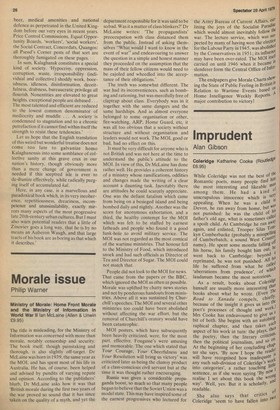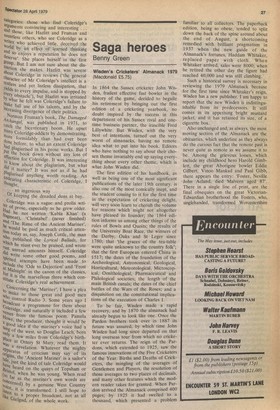Imprudent
Alan Gibson
2Co6.I9e5r)idge Katharine Cooke (Routledg" While Coleridge was not the best of die Romantic poets, many people find hull, the most interesting and likeable 013'i among them. He had a kind unscrupulous innocence which is ver1.appealing. When he was a child In Devon, he ran away from home, but via.s not punished: he was the child of 1",s father's old age, what is sometimes cane', a spoilt child. At Cambridge he ran Oa) again, and enlisted, Trooper Silas -1"°111,. kyn Comberbacke (probably a misspe1114 of Cumberbatch, a sound West Coif/ name). He spent some months falling ° his horse, his family bought him one, he went back to Cambridge: beyond ,a5 reprimand, he was not punished. Ad 111, life he suffered from what he 'aberrations from prudence', of calrb whIc laudanum became the most notorious, As a result, books about Coleridge himself are usually more interesting books about what he wrote. (Even Mr Road to Xanadu compels, chief!! ' because of the insight it gives us into Mel poet's processes of thought and vie11( Mrs Cooke has endeavoured to give tis bit of both. She begins with an autoblah raphical chapter, and then takes eaco aspect of his work in turn: the plays, e.he the poetry, then the literary criticise"' then the political journalism, and so 011' At the beginning of her concluding chAarr ter she says, 'By now I hope the re"“e.s will have recognised how inadequate lk any such sub-division of Coleridge's w.cInie into categories', a rather touching Iitt sentence, as if she were saying 'By lict realise I set about this book the WI way'. Well, yes. But it is scholarly, all readable. She also says that critics of Coleridge 'seem to have fallen into tvl categories: those who find Coleridge's arguments convincing and interesting ... and those, like Hazlitt and Fruman and countless others, who see Coleridge as a writer who achieved little, deceived the World by an effect of learned thinking and so enjoys a reputation he does not deserve'. She places herself in the first 8.r°uP. But I am not sure about the distinction she makes. Hazlitt was severe about Coleridge in reviews (`the general Character of Mr Coleridge's intellect is a restless and yet listless dissipation, that Yields to every impulse, and is stopped by LeverY obstacle'), but Hazlitt was irritated by what he felt was Coleridge's failure to 'flake full use of his talents, and by the Increasing divergence of their politics. Norman Fruman's book, The Damaged Archangel, was published in 1971, to Catch the bicentenary boom. He upset illanY Coleridge-addicts by demonstrating, more formidably than had ever been d, one before, to what an extent Coleridge had plagiarised in his prose works. But I Put the book down without any loss of affection for Coleridge. It was interesting to know about the plagiarism, but what did it tnatter? It was not as if he had Plagiarised anything worth reading. An endearing characteristic of Coleridge, I thought, • • an ingenious way Of keeping the dreaded duns at bay.
Coleridge was a vague and prolix writer of prose, especially as he grew older. Had he not written 'Kubla Khan' (a "gment), `Christabe (never finished) and The Rime of the Ancient Mariner', Ile would be paid as much critical atten tion today as, say, Joseph Cottle, the man Who published the Lyrical Ballads, for Much he must ever be praised, and wrote ,va.at unread amounts himself. Coleridge did Write some other good poems, and s,Pinted attempts have been made to ilielude the 'Ode to Dejection' and 'Frost !.t Midnight' in the canon of the classics, unt it is the marvellous three which constitute Coleridge's real achievement. Concerning the 'Mariner', I have a plea to make to those great and good men broadcast control Radio 3. Some years ago I u_roadeast a programme for them about .uoleridge, and naturally it included a few irses from the famous poem. Pamela Howe, the producer, thought it would be a o t good idea if the mariner's voice had a oatlig of the west, so Douglas Leach, born a few miles from Coleridge's birthPlace at Ottery St Mary, read them. It :vas a revelation. Whatever the mighty 4013paratus of criticism may say of its !ale, the 'Ancient Mariner' is a sailor's hale, just the kind of tale Coleridge would uav.e heard on the quays of Topsham or 71istol, when he was young. When read ,ss° far as the mariner's own words are toneerned) by a genuine West Country h°Ice, it is transformed. I still hope to iii.sten to a proper broadcast, not at all "e Gielgud, of the whole work.







































 Previous page
Previous page